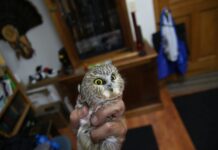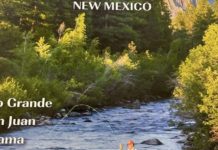I was near enough to death that I started worrying about who’d distribute my fly rods after my passing. I have a collection of sticks that makes it obvious I was a bachelor with little regard for financial responsibility for a good long while, and I want certain rods to go to certain folks. I knew my dad would take all my Winstons, every bamboo rod, and ensure that Ryan McCullough ended up with my Tom Morgan Rodsmiths. And there’s the matter of my bamboo rod shop, which must go to someone who will carry on the craft – but who?
Bent over, heaving in giant gulps of fresh Rocky Mountain air, I stood in the middle of a faint trail that switchbacked down one side of a steep gorge and acknowledged my hyperbole, even if it was warranted. Three switchbacks below me, my best friend Lander Crook assumed a position a mirror image of my own. Below us both was a swirling river, a ribbon of white and reflected light amidst a sea of scrub oak, sage brush, and a few random pinyon pines.
A combination of altitude, little sleep, and a hike far more strenuous than either of us anticipated, had us both wondering if we’d make it back to my truck, which was parked another mile straight up that son-of-a-bitching canyon. We were high up in the Wind River Mountains, miles from cell service or other people. The only company we’d had all day was a rattlesnake and some 50-odd trout.
When we finally crested the ridge of the canyon and saw my dirty Tacoma, it was very nearly manna from heaven. Lander fished waters out of a cooler in the bed while I looked at my GPS.
“We gained 1,200 feet of elevation in less than a mile,” I said. “From the river up to the middle of the canyon.”
Lander nodded. “That tracks. Let’s get out of here and find some food.”
Later, back at a cabin Lander’s family had rented on the banks of Louis Lake, we sat around a billowing campfire, ate tacos, and recounted our day’s adventure. The fishing was typical of the high country, but the fish were slightly larger than average.
For the stream at the bottom of that hellhole of a canyon, though, the trout we caught were apparently smaller than they should’ve been.
Lander’s family has fished that canyon for years, and around the campfire we heard stories of two-foot brown trout breaking off $20 Rapalas. I passed around my phone, showing off pictures of what we’d caught that day. The fish were bright and wild, but none exceeded 14 inches. They were, as Lander’s dad said, “Smaller than I expected from a big-time fisherman like you.”
I took my phone back before anyone could find the pictures of the even smaller – but brilliantly colored – brook trout Lander and I had caught on the way back to the cabin. I’d had enough ridicule for one evening.
A week later I was in Oregon with Ryan McCullough and his son Josh. It’s an eight-hour drive to this river in Oregon from my house near Salt Lake City, and I didn’t get to the river until nearly midnight on a Thursday. It’s a slog of a trip, and I-84 through Idaho is perpetually under construction, but the river’s big browns more than justify the travel.
Not to mention this was my bachelor party, and probably my last chance to fish with Ryan for the next four or five years. We’d planned the trip smack in the middle of the frenetic last-minute planning for the wedding, which would happen a week after the fishing trip was over. I felt a little guilty at leaving my fiancé and mother-in-law to handle the last of the wedding preparations; then again, I hadn’t wanted a wedding. I’d wanted to elope and forgo that day of matrimonial frivolity.
The first morning in Oregon we were up at dawn, scanning the river for rising trout. We’d come to catch big browns on small dry flies. This river in Oregon is unique in that it seems to spur bigger-than-normal trout to eat off the surface. It’s not uncommon to see a dozen or more browns over 22 inches, rising together in a pool or at the tail of a riffle. Once, years ago, Ryan caught a 26-inch brown on a skwala.
A dry fly. Not a nymph.
And, it’s the river where I’ve hooked into multiple trout that, if I’d have landed them, would certainly go in the books as my personal best on a fly rod. While those fish never made it to the net, the possibility of seeing them again is largely why I keep going back.
As it turned out, I’ll have to make at least one more trip to Oregon. For three days, we fished long and hard, looking for even the tiniest of rises and hoping it could turn into a weak hatch. Aside from one fish just outside of camp that rose for everything in the river except our flies, there wasn’t any sign of the monster trout.
It was a great trip in that I got to see Ryan and Josh. But more than once, during the long afternoons spent chasing the silence of a PMD or caddis hatch, my mind drifted back to the week before in the Winds, with Lander. Sure, most of the fish in the river in Oregon could’ve eaten everything we caught in Wyoming, but that’s not really the point.
Even though they were small fish, chasing those wild browns and bows in Wyoming was an immersive, all-hands-on-deck experience. More fun, certainly, than spending the better part of a week hoping for a big trout that never showed up.
Aside from a strand of broken lights, and an indiscreet photographer, the wedding went off without a hitch. The evening after the wedding, we boarded a flight from Salt Lake City to Fairbanks – I’d convinced my wife to honeymoon in Alaska.
We landed in Fairbanks around midnight, under the first truly dark Alaskan sky I’ve ever seen (I’ve never been there so late in the year before – it felt startlingly normal). The next morning, rain spattered off and on, and fog lay low, weaving through the sickly-looking pine trees that barely cling to life that far north.
Somehow, I convinced my wife to stop and fish with me for a few minutes in that mess of cold and wet. We took a dirt road in the rental car, parked next to a river, and threw on waders and rain coats. Two days prior, we’d been in Utah where the temps hadn’t dropped below 95 degrees in weeks. Now, my wife shivered and I cinched my jacket up against the Arctic’s summer chill.
The river was a bit off-color from all the rain, but still fishable. I waded out to the tail of a deep pool, and threw a lazy cast upstream. There weren’t any salmon, or dolly varden, or rainbow trout in the pool.
Instead, it was full of grayling.
Within minutes, I had a sizeable fish leap from the depths, inhale my dry fly, and rocket around the stream, waving its dorsal fin against the current in an effort to free itself from the hook. It wasn’t a big grayling by Alaskan standards – 15 inches, at most – but it was fat, and beautiful. And, it was the first grayling my wife had ever seen in person.
We’d flown all the way to Alaska, at the peak of silver salmon season, and instead spent our time together on a spring-fed river full of nothing but small grayling.
I wouldn’t have wanted it any other way.
When we’re kids, we see the world as this vast, impenetrable place, full of incomprehensible mysteries and adventures. Childhood haunts – stretches of forest, tree forts, or the basement at grandma’s house – are endlessly intriguing, but when you revisit them as an adult, they feel so much smaller, and certainly less wondrous. It’s as if the places changed – but they haven’t. Your perspective has.
At 10 years old, on a pond tucked away near the cabin our family had for years while I was growing up, the 16-inch rainbow trout my six-year-old brother caught was a veritable monster. That picture hung on our kitchen wall for years. The rainbow was fat, healthy, and a few months removed from leaving the stocking truck, but to a 10-year-old it was everything a fish should be.
I saw that picture a few months ago, when I was back home for a funeral. The fish didn’t seem as big, but the smile on my brother’s face hadn’t faded. It was the first time I’d seen that picture in years, and looking at it as a grown man, who’s traveled far too much to catch trout and salmon, I knew it wasn’t the length or girth of the fish that had my brother grinning ear-to-ear.
It was the fact that he’d caught a fish, on his own, and it was his.
Credit: Source link































